As Roger Waters' Us + Them movie is released in cinemas, we revisit our exclusive interview ahead of the Australian leg of his world tour nearly two years ago.
This story originally appeared in The Courier-Mail's Qweekend magazine on February 3, 2018.
CONSIDERING he performed to a sellout crowd at Auckland’s Spark Arena the previous night, and faces the prospect of doing the same the following night, Roger Waters looks remarkably relaxed when he walks into the hotel room for our interview.
The bassist and singer was a founding member of English rock band Pink Floyd, and after the departure of original lead singer and main songwriter Syd Barrett, he steered the group creatively through their most commercially successful and artistically ambitious period from 1968 until his acrimonious departure in 1985. He is now at the helm of a solo tour that includes a 10-piece band, 65-person road crew and truckloads of props and stage equipment.
He has spent his day off fly-fishing at Waiheke Island, about 20km off the coast of New Zealand’s largest city, and, aside from his bare feet, he’s dressed in almost identical attire to what he was wearing on stage less than 24 hours earlier – a slightly faded black T-shirt and well-worn blue jeans. With tousled grey hair, a toned, wiry frame and standing at 191cm, he looks much taller up close than he appears when dwarfed by the enormous screens adorned with dystopian imagery that provide the backdrop for his live shows, and he looks remarkably good for 74. In fact, as the man who sang “If I had been God / I would have rearranged the veins in the face to make them more resistant to alcohol, and less prone to ageing” on last year’s single Déjà Vu (from current solo album Is This the Life We Really Want?)takes a generous sip of Marlborough sauvignon blanc, his piercing sky-blue eyes remain his most conspicuous facial feature, and he could pass for a decade younger.
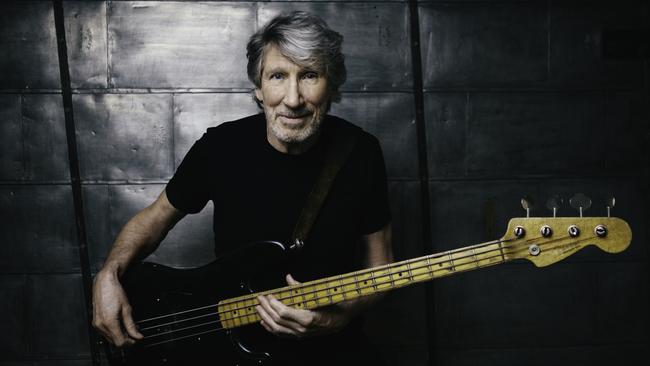
Waters was only five months old when his father, Eric, was killed in World War II during a battle with German troops in Anzio, Italy, in early 1944. He and his brother John, two years his senior, were raised by his schoolteacher mother Mary, a pacifist and socialist who encouraged his anti-authoritarian streak – at 15, he was chairman of the Cambridge Youth Campaign for Nuclear Disarmament.
“If you’re born into a family where one of your parents is deeply religious and committed to Jesus Christ and that whole thing, and the other one is not, and is a sort of radical atheist, they were both very left wing, but if the one who believes in God is dead, and the one who doesn’t is alive, it’s likely you will absorb a lot of that.
“Having said that, I’ve thought a lot about this through a lot of my life and it’s very hard to come up with any kind of an argument for why any kind of a supreme being exists. It’s very illogical and hard to support the notion that that might have something to with the reality of our lives.”
There is, however, one lord – or, rather Lorde – he’s happy to praise. At his first Auckland show, Waters applauded the Grammy-winning New Zealand artist Ella Yelich-O’Connor – Lorde to her legion of fans – for her recent decision to cancel a scheduled show in Tel Aviv. “Bless Lorde,” Waters says. “I have no idea who she is but I’d love to meet her – that is a brave thing she did.”
At the time of our chat, Waters still has another two dates to go on his New Zealand tour, but he’s looking forward to getting to Australia, promising the visual spectacle will be even more impressive here. “I’m glad we’ve managed to reinforce the roof at (Melbourne’s) Rod Laver Arena so we can do a bigger show than we did the other night,” he says. “That was six screens, well it’s normally eight, and it is usually 25 feet (7.6m) taller.”
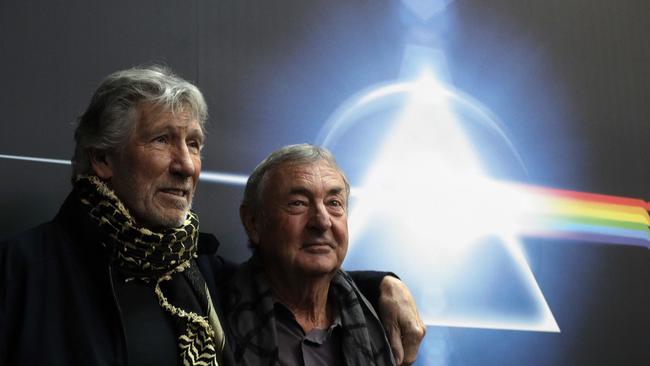
Eight years ago, as he was preparing to take his The Wall Live show on the road, Waters told Associated Press, “I have a swan song in me and I think this will probably be it."
The Wall Live, which played to more than 4.5 million people on four continents between 2010 and 2013, became the most successful concert tour in history by a solo artist, but Waters says it wasn’t the popularity of that tour that provided the catalyst for his return to the recording studio. “It was while on that Wall tour, I was in the hotel room one day and I wrote Lay Down Jerusalem or If I Had Been God,or as it’s known now, Déjà Vu on the new record,” he says.
When Waters and his creative director Sean Evans were working on the concert film to document the Wall tour, Evans suggested they enlist Nigel Godrich, best known for his work with UK band Radiohead, to produce the audio. “He knew Nigel, who came in at the end of the making of the film project and helped produce the recordings of the live shows for the movie, and that’s how I got to know him,” Waters says.
“It turned out he was a huge fan of my period of Pink Floyd – not of the rest – so we decided we’d make this record (Is This the Life We Really Want?) together. I played him a demo of a very long radio play (also) called Lay Down Jerusalem, that has tonnes of songs in it, and is a couple of hours long, and said, this is what I’m thinking of doing. He went, ‘Hmmm, it might be a good radio play but it’s not really a record, is it?’ He said, ‘Anyway, your radio play is quite boring because it’s continually polemic … a record is a hard-to-define entity but brevity is probably a good thing’, and I thought, yeah, that sounds fine, that sounds fair enough to me.”
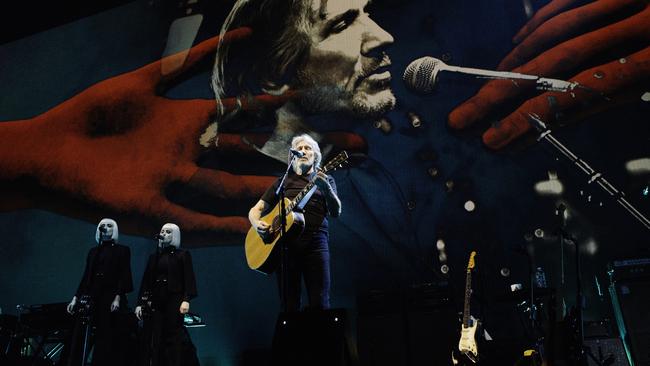
When I compliment Waters on the self-deprecating humour he has employed in the opening lines of Déjà Vu, and ask how he knew he was on to something, he wryly smiles. “How did I know? I’ll tell you what it is, it’s a supreme example of my enormous talent of finding weird rhymes and rhythms within the meaning of the English language,” he says, chuckling at his own false immodesty. “It’s about rhythm … I don’t really give a f--- about veins.”
Of course, the song quickly and ominously changes tack, with the tongue-in-cheek self-aggrandising of the “If I had been God” first verse replaced by the solemn “If I were a drone, patrolling foreign skies / With my electronic eyes for guidance, and the element of surprise”.
“Right,” Waters says, his tone suddenly shifting from playfully hubristic to sombre and downcast, his voice from a boisterous near-shout to an almost-whisper.
“When I write in the second verse, ‘I would be afraid to find someone home’, I could almost tear up now, thinking of a woman just baking bread, making rice and suddenly some asshole sitting in Nebraska, or not an asshole if you watch (Malaysian-born documentary maker) Sonia Kennebeck’s movie National Bird, which is about the deleterious effects that sitting in Nebraska, killing people with drones, 5000 miles away, has on the minds of the poor people who have to do it – it’s terrible, it’s crippling.”
A handful of other tracks from the latest album are sprinkled throughout the set on the Us + Them tour, with the fiercely anti-war-machine Smell the Roses, venom-spitting Picture That (“picture a shithouse with no f---ing drains; picture a leader with no f---ing brains”) and the haunting The Last Refugee all getting an airing in Auckland.
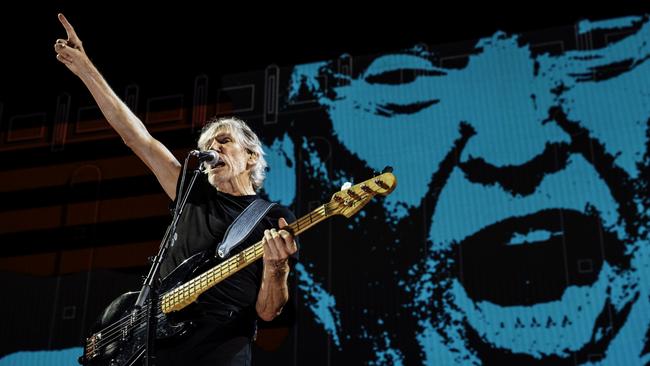
The tour takes its name from the Pink Floyd song Us and Them , from 1973’s The Dark Side of the Moon – which remains the third-highest-selling album of all time – and fans will be pleased to know an embarrassment of riches from his former band’s back catalogue, including Money , Another Brick in the Wall Part 2 , Comfortably Numb and Wish You Were Here , feature in the more-than-20-song set.
Other key songs include Dogs and Pigs (Three Different Ones), from Pink Floyd’s George Orwell-inspired 1977 album Animals, which is accompanied by a spectacular audiovisual display. Without giving too much away, even those in the “cheap seats” can expect an impressive view.
“I’m so glad you were there last night,” Waters says, “because for the first time ever, (backing singers) Holly (Laessig) and Jess (Wolfe) sang ‘Lay down Jerusalem, lay your burden down’, which was always the chorus of Déjà Vu, and was censored from the song by Nigel Godrich.
“I’m not blaming him, because obviously I had to go along with that at the time. Obviously I could have said ‘f--- you! Blah blah blah’, but I didn’t, I decided I was going to work with him and I’m really happy I did, I think he made a great album. But whenever there was any reference to the Middle East he would try to censor it and remove it, on the grounds I might put people off, that people are sensitive.”
Those who have followed Waters’ career will know his music and social and political commentary are inextricably linked. Unsurprisingly, criticism of US President Donald Trump features heavily throughout the concert, particularly in the show’s second half, with unflattering, digitally altered depictions of Trump projected on to screens alongside renderings of some of his most outrageous quotes and tweets.
“Every week Trump says something absurd and so we take stuff out and put that in and keep updating it,” Waters says. “It’s kind of important to keep pointing the finger at how absurd it is that this f---ing moron is the President.”
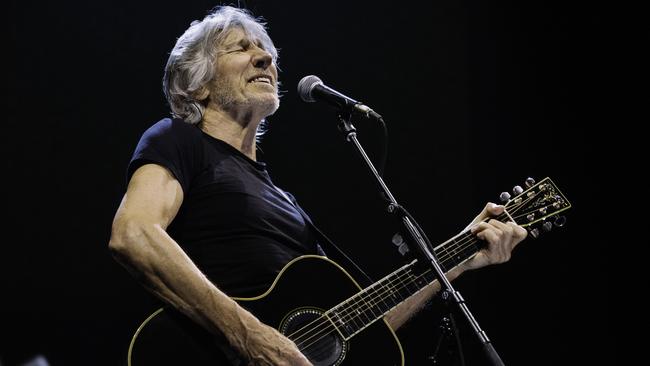
Trump apparently attended one of Waters’ US concerts when he was touring The Wall in 2010 and, according to some accounts, left during the intermission, meaning he would have seen the Wall erected, but not knocked down, a detail Waters is unable to confirm. “How would I know? I had no idea he had been until he was president, and then somebody told me. Apparently one of the idiot sons is a huge fan and came eight or nine times; they probably believed I was a white nationalist supremacist Nazi, and that I meant all that stuff … all the satire.”
Waters has been an outspoken critic of Israeli-occupied territories, and has been a leading figure in the Boycott, Divestment and Sanctions Movement, a global campaign that agitates for equality for Arab-Palestinian citizens of Israel. Despite espousing what he deems to be pro-egalitarian sentiments – and repeatedly stressing that he hates what he sees as apartheid, not Israel itself – his involvement has led critics to label him anti-Semitic, something that clearly rankles him.
“It’s obviously f---ing stupid,” Waters says, his voice rising. “It’s so stupid; I have many great Israeli friends who hate the occupation, who loathe what their state is doing in the name of their country and also in the name of Judaism, which it does not represent. But it’s indefensible what they’re doing. The fact that we all care about one another is the only way we can save this planet for, who knows, another million years? A few hundred thousand years?
“This planet is f---ing dying, but it’s dying at an exponentially fast rate because of your greed and because you don’t care about your fellow human beings, and you don’t believe that Aborigines and Maoris and Ecuadorian Indians, or the Welsh, or the Scots, or the Irish or whoever it might be, have the same rights that you do – or if you’re Israeli, the f---ing Arabs. It goes back to saying, do we care about 1948 and the Universal Declaration of Human Rights? Either we do or we don’t.”
Waters peers down at the roads, 20-odd storeys below, and rhetorically asks: “Why are these streets here not packed with people going, ‘No, we don’t want you to f---ing kill us all with your f---ing insane beliefs’? Sorry,” he says, laughing. “You know what? My Pink Floyd in the ’70s has a certain kind of thread to it, whether it’s me ranting on about Margaret Thatcher in The Final Cut, or whether it’s Dark Side of the Moon and questioning all kinds of stuff. There is a thread to it, and it continues.”
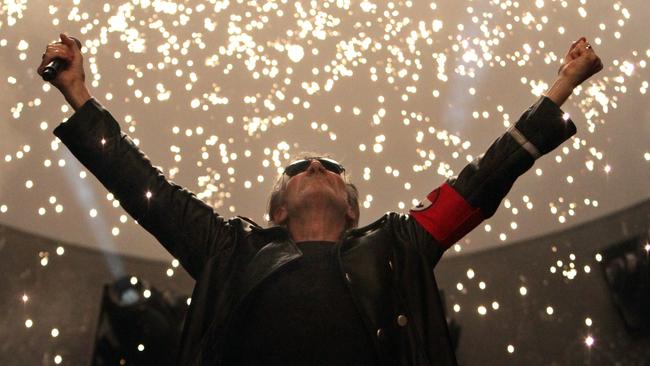
Most of the players from the Is This The Life We Really Want? recording sessions have now joined Waters on the road, including guitarist Jonathan Wilson, who also sings lead vocals on many of the Pink Floyd numbers; bassist and multi-instrumentalist Gus Seyffert; drummer Joey Waronker; and backing vocalists and percussionists Wolfe and Laessig. When asked if the new band has reinvigorated him, Waters is effusive in his praise. “Oh, yeah, yeah, yeah, well you saw it last night,” he says. “I love working with this band; I didn’t know Joey at all before making the record and Nigel said, ‘I think we should work with this drummer’. There were things that came out of those sessions that were so beautiful. The part on The Last Refugee , which we do live now, is so stunningly kind of spare and beautiful and tragic.
“I love him, but this whole band feels really good, thank goodness, because we did 64 dates in the States and Canada – which sounds like a lot, and it is a lot – but we’re doing a few here and Australia, and then Europe, it’s a real slog. I know it’s a stupid cliche, but we are a big family, and it’s a beautiful thing, because it’s a microcosm of how a society might work, in a way.”
It marks a big change from the passive-aggressive denigration Waters says he received from his former bandmates before his departure from Pink Floyd in 1985. Waters – who has since reunited with his former bandmates David Gilmour, Nick Mason and Rick Wright for the first time in more than two decades for a one-off appearance at the Live 8 concert at London’s Hyde Park in 2005 – admits it led him to doubt his talents, even when the band he was creatively steering was writing some of the most popular albums of all time. “There was a weird dynamic in Pink Floyd where, because I did so much of the heavy lifting in terms of what we did and what it was about … because I was so powerful in that thing, they tried to put me down in any way they could – (it was mostly) David and maybe even Rick (who died in 2008) a bit. Nick would go whichever way the wind blew. So they’d say – ‘oh, he can’t sing’; ‘oh, he’s got a terrible ear’; ‘oh, he can’t tune his bass’; and maybe I let some of that get to me at some points because I had no idea whether they were right or wrong. I now know, perhaps not with Rick, but I’ve got more music in my little finger than what’s-his-name,” he says, presumably referring to Gilmour.
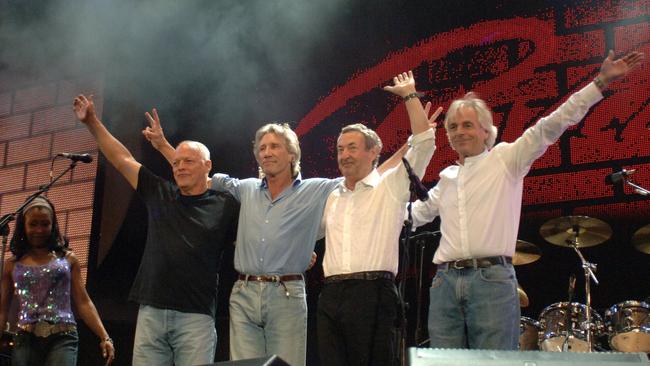
The feelings of diffidence that plagued Waters at the height of Pink Floyd’s popularity have long since passed, and these days he’s definitely living the life he wants to, and feels as though a weight has been lifted from his shoulders – creatively at least. “We are all saddled with self-doubt; our parents probably are sitting on our shoulder as judges, so we all have this sort of raven that sits there and goes ‘you’re f---ing useless’ and, if at some point in our lives we’re able to go, ‘hey, you’re f---ing kidding me’, and break its legs and throw it to the ground and say, ‘I do not need a judge sitting on my shoulder’, if you figure that out, you’ve come a long way toward beginning to understand what it may be like to be happy – or to be human even.”
Despite all his rancour, Waters insists he’s “not a pessimist”, and more than 50 years after Pink Floyd released their first album, he’s enjoying being on stage more than he ever has.
“Yeah, I’m really happy; I’m working with people I really like working with,” he says. “The only thing that might prevent me from continuing to create new work and to make contributions to the cause of my own and other people’s happiness, some of the impediments to this that you bring out – the judge on the shoulder – is by and large gone. Unfortunately one runs out of time.”
Us + Them screens at various cinemas on October 2 and 6. For tickets and session times, visit rogerwatersusandthem.com

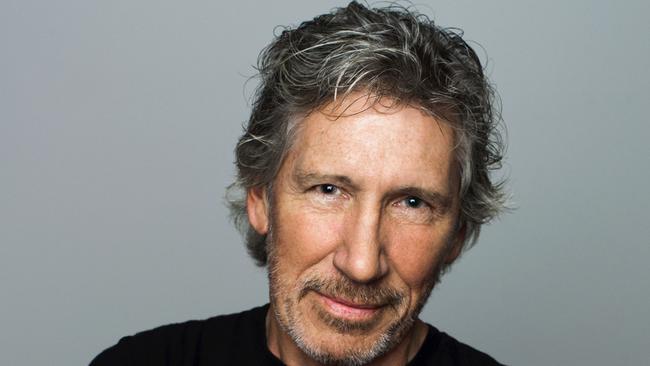
Add your comment to this story
To join the conversation, please log in. Don't have an account? Register
Join the conversation, you are commenting as Logout